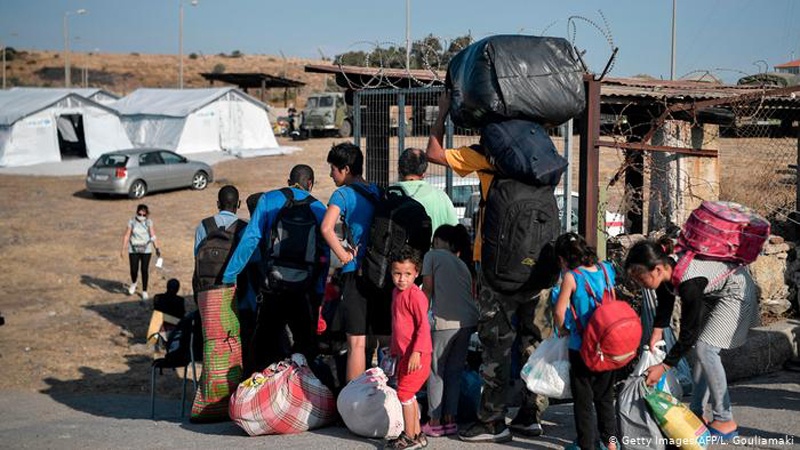
LESBOS: Germany said Tuesday it will take in more than 1,500 refugees from Greece on top of the 150 unaccompanied minors whose camp burned down on the island of Lesbos as Berlin tried to rally a fresh EU response to a years-long migrant crisis that flared anew. EU countries have been forced to tackle the issue as thousands of former occupants of Moria camp on Lesbos have been sleeping rough in abandoned buildings, on roadsides and rooftops, after their shelters were destroyed by the blaze on the night of September 8.
German Vice-Chancellor Olaf Scholz said Chancellor Angela Merkel's left-right coalition had agreed to take in 1,553 refugees from Greece, on top of the 150 unaccompanied minors from the burned out camp. Germany will now also welcome families with children who have already secured refugee status in Greece but may not be from Moria.
France has agreed to take in 150 minors from the camp while other EU nations are admitting a total of 100 other youngsters from Moria. Merkel bemoaned the lack of a concerted European response Tuesday in comments attributed to her.
"This is not a sign of Europe's values and capacity for action," she told a meeting of her parliamentary group in Berlin, according to participants. Meanwhile Greek officials said six suspects, including "young foreign nationals," have been arrested in Lesbos in connection with the fire.
Greek officials have said several times that the fire was started by migrants who faced isolation after testing positive for coronavirus. Another fire broke out late Tuesday near a camp on the island of Samos where over 4,700 migrants live. "There is a forest fire near the camp, but it looks manageable," a fire department source told AFP.
Need 'strong' EU response
European Council chief Charles Michel, flying to Lesbos after talks with Greek Prime Minister Kyriakos Mitsotakis in Athens, urged the 27-nation bloc to "take more responsibilities. "We want to support the efforts made by the Greek authorities," Michel said. "We need to make more progress to improve our border controls…we need to have more partnerships with third countries, we cannot solve everything alone," he said on a hill overlooking a new tent camp hastily put together by Greek authorities.
EU home affairs commissioner Ylva Johansson said between "8-9,000 will be able to find immediate temporary shelter" there. Five years after the arrival in Europe of over a million asylum seekers, many fleeing wars in Iraq and Syria, the question over how the bloc should share out its refugee responsibilities remains sensitive.
Opposition from Poland, Hungary, the Czech Republic and Slovakia over taking in refugees has been a major stumbling block in the EU's attempt to reform its migration and asylum policies. Even in Germany, politicians are wary of seeing the same scenes of huge migrant arrivals as in 2015, which the far-right capitalised on to gain a foothold in parliament. This time round, Merkel's government has repeatedly insisted it is key to find a European solution to the issue. A "just, strong and efficient response" to the problem is needed, Michel said in Athens.
1,000 migrants in new camp
Many migrants have refused to enter the new camp of white tents near the eastern port village of Panagiouda, fearing they will be unable to leave once inside. Others, though, have reluctantly made their way to the site in the searing heat.
On Tuesday, the Greek migration ministry said roughly 1,000 of the 12,000 Moria migrants had been housed at the site. Among them, 21 have tested positive for coronavirus.
"There's nothing in the camp, no shower, no mattresses," Malik, an Algerian migrant, told AFP by phone from inside the camp where he now lives with his wife and five children. "There is only one meal per day, and they give us a carton with six bottles of water," said the French language teacher. Many migrants also fear the animosity of Lesbos residents. There have been frequent incidents between the asylum seekers and locals, including those from the far-right, since last year.
Kostas Mountzouris, governor of the North Aegean region covering Lesbos and one of the most ardent opponents of the new camp, has called on local businesses to protest on Tuesday and seek "the removal of migrants from the island". - AFP
.jpg)



